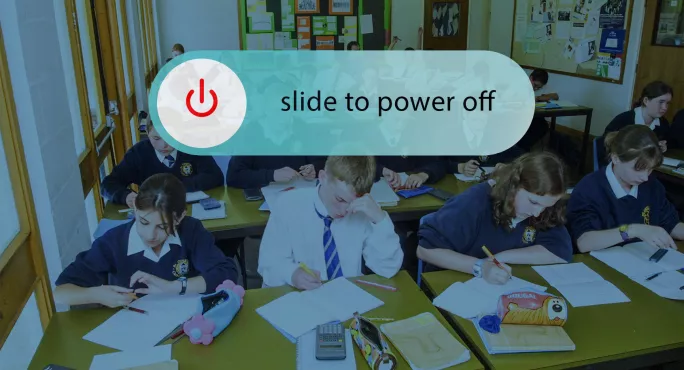Phones in schools: what’s happening in Scotland?

The teachers at Craigroyston Community High School in Edinburgh were “buzzing” when head Shelley McLaren told them she planned to ban mobile phones in S1. Coming back from maternity leave with a stack of professional reading under her belt, McLaren had found no evidence that having mobiles in school was beneficial and plenty of evidence that they were causing harm.
She resolved then to do something about it.
The ban on phones in S1 (although McLaren doesn’t like to call it a “ban” - she says that sounds “a bit extreme”) came into effect at the start of the school year in August.
Students check in their phones at the start of the day and check them out when they leave. If a teacher sees an S1 student with a phone in school they call a member of the senior management team, who comes and confiscates it.
“I wanted to take it out of the hands of the teacher - I didn’t want them to have to do anything because it just causes conflict,” says McLaren.
School phone ban ‘a relief for students’
The impact of the ban has been “incredible”, says McLaren: she has seen relationships between staff and students improving. Students have become more active at breaktime and admit that they are starting to see the benefits themselves.
“They say it’s actually a relief not to have their phone because they are not constantly in demand and there’s not that expectation that they have to answer all the time,” says McLaren.
When Scottish government guidance on the use of mobile phones in schools is published in the coming weeks it is expected to give headteachers the freedom to ban phones - but to stop short of mandating a national ban.
This could be interpreted as a failure to take decisive action. In England, the government released non-statutory guidance in February recommending the prohibition of phone use during the school day. In Scotland, too, it certainly feels like the evidence against having phones in school is mounting.
- Behaviour: Research shows the big picture for behaviour in Scottish schools
- Edtech: Scottish government under fire for changing free laptops policy
- In England: MPs urge next government to monitor school “mobile phone ban”
Longitudinal Scottish government-funded research published in November found “a general deterioration in the behaviour of pupils in primary and secondary schools in Scotland since 2016”.
In secondary schools, the biggest negative impact on the learning experience reported was students using and looking at mobile phones and tablets when they should not be.
The Programme for International Student Assessment (Pisa) reported in December on the impact of devices on learning, saying that “a higher proportion of students in Scotland reported that students get distracted by using digital devices, both their own and by other students using them”.
School leaders also say that phones are fuelling one of the biggest discipline problems they have been dealing with this year: internal truancy, which refers to pupils attending school but not class. They say pupils use phones to arrange to meet in toilets and other places away from teachers’ watchful eyes.
Then there is research from outside Scotland. Last July Unesco’s 2023 Global Education Monitoring Report, Technology in education: a tool on whose terms?, called for a ban on smartphones in class. It advised that technology should only be used in school “when it supports learning outcomes” and that “mere proximity to a mobile device was found to distract students and to have a negative impact on learning”.
In other words, even if a pupil switches their phone off, puts it in their bag and stuffs that bag under their desk, the knowledge that their phone is close by still has the power to distract them.
The report said one study had found that it could take students up to 20 minutes to refocus on what they were learning after engaging in a non-academic activity.

More recently a Norwegian study linked smartphone bans with improved grades, better behaviour and improved mental health. And a report from think tank Policy Exchange found that schools with an effective smartphone ban - that is, where they are banned throughout the day - had better results and Ofsted ratings.
A Tes article this month, however, set out the limitations of the latter study, including the relatively small number of schools involved.
Teachers have mixed feelings
Still, despite the mounting evidence, Scottish teachers and school leaders seem to have mixed feelings about banning phones.
McLaren says the teachers in her school were brimming with enthusiasm about the prospect of outlawing phones - and some want the S1 ban extended to other year groups.
However, a survey carried out by the Scottish Secondary Teachers’ Association (SSTA) involving more than 1,000 members, published in March, showed that while 75 per cent of teachers reported that either most or all of their lessons were interrupted by students being told to put their phones away, only 37 per cent supported a complete ban of mobile phones in school. A further 22 per cent supported a ban in class.
The survey also showed that more than 60 per cent of teachers used phones in lessons, suggesting that they can be useful for learning. However, the survey also suggested that they were used sometimes simply to get around unreliable wi-fi or a lack of access to other devices.
Responsible use of mobile phones
Some headteachers make the case that schools should teach responsible use of mobile phones instead of banning the devices altogether. For anxious children, being able to easily keep in touch with home via their mobile is flagged as a benefit, and then more practical considerations can come into play like pupils needing their phones to order or pay for school meals.
But the argument that schools can use phones to enhance learning and teaching is one that McLaren has little truck with, especially given her own school’s context.
Craigroyston serves some of the most disadvantaged communities in Scotland and many students cannot afford a mobile phone. Staff would, therefore, never ask an entire class to get their mobiles out during a lesson because it would be inequitable. Even if students have phones, they don’t always have data and the ability to get online, adds McLaren.
Another reason why schools are shying away from a ban is the fear that it will be impossible to implement. But Clare Smith says it took just three days for her school to get rid of phones.
Smith is head of senior school at Robert Gordon’s College in Aberdeen - an independent school - where since January 2023 phones have had to be off and out of sight when students are on school grounds, whether stashed in a school bag or in a pocket. If phones are seen during the school day they are confiscated.
“We don’t do a warning - we just say, ‘I see your phone, I’m going to take it,’” says Smith.
On the first day of the ban around 20 phones were confiscated.
“I think the kids thought we were never going to see it through,” says Smith.
By the third day just five or six phones were confiscated and now, on a normal day, anywhere from no phones to three or four are taken.
But the policy - triggered following the Covid lockdowns because the school felt that students were “undoubtedly addicted to checking and scrolling on their phones” - was not a bolt from the blue. Smith stresses that communication has been the key to its successful implementation.
Everyone must understand ‘the why’
Her advice is “don’t have a hole in your bucket” - by which she means that every staff member has to be on board and students, staff and parents have to understand “the why” behind a policy.
“The way I pitched it to pupils was: ‘We don’t know what the effect is of you constantly having your phone on you all the time, and we will not know for maybe another 10 years.’”
With no conclusive research likely to appear soon, she told students, “That’s a bit of risk for me,” and, “I don’t want you to be the experiment”.

At Craigroyston, McLaren says the key to the success of its policy has been consistency: “You need to absolutely do what you say you are going to do.” She adds that starting with S1 has made a ban more manageable.
“In primary, they have never had their phones, so if you introduce a ban in S1 you aren’t trying to take anything away,” she says.
Now, McLaren says, many S1s do not bother bringing their phones to school, which has reduced the queues checking in their phones and checking them out, before and after school.
But for young people who have grown up with devices, the fuss over phones can sometimes seem a bit extreme.
Students defend having access to phones
That came across loud and clear in a BBC Radio Scotland programme on the issue in April, when two secondary students mounted a robust defence of retaining access to their phones in school.
There was too much of a focus on the negative aspects of phones, they said, and having the ability to chat to your mum every day, one student argued, was “honestly really good”.
When it was suggested that mobile phones should be considered in the same category as drugs and alcohol because they are designed “to addict and distract”, the students were aghast. Drugs and alcohol did “really serious damage”; phones were “not as bad”, they argued.
But now bans are in place in their schools, Smith and McLaren both say students have gradually been won around.
Initially, Smith says, students were “grumpy” about the policy but over time objections “quietened down a lot”. Then Education Scotland inspected the school and included a comment about the policy in the report published on 7 May that made Smith’s day.
The report said that, overall, students spoke “very positively about the whole-school policy that does not permit mobile phone use at any time during the school day”. They reported that the policy had “improved their concentration levels in lessons” and “helped them to develop better socialisation and communication skills.”
Both school leaders extoll the virtues of banning phones - McLaren plans to carry on the policy into S2 and with the new S1s when they arrive in August. By degrees, she is determined to make her school phone-free.
Smith, meanwhile, says the policy has had just one downside - most teenagers don’t wear a watch and use their phones to tell the time, “thus providing a ready-made excuse for turning up late”.
‘Safeguarding is tighter’
She says her school is calmer, the learning environment has improved, lesson changeover is quicker and the outside areas are noisier but nicer “because they are all out playing again”.
One depute head at school used to spend “all of her days looking at screenshots, dealing with friendship issues, things being filmed, things being photographed” but now such incidents are rare.
Perhaps the most convincing argument that Smith makes is that “safeguarding is tighter”.
“You have to think of the internet as a place people go to - physically they are in the school building but on their phones they could be anywhere, they could be talking to anyone,” she says. “I feel like I can more confidently say, ‘Yeah, when kids are at school they are safe.’”
Ultimately, though, it seems likely that in Scotland it will be left to individual schools to chart their course - be that a ban or a more flexible mobile phone policy.
Until wi-fi is reliable and every pupil has a device for learning - a promise the Scottish government recently rolled back on - the ability for headteachers to respond to their particular context is appropriate and necessary.
The most important thing for teachers is that irrespective of what the policy is, it is consistently applied. The SSTA research on phones in schools found that secondaries were “struggling” to implement mobile phone policies. Most teachers (72 per cent) said their school had a policy, but only 10 per cent said it was extremely or very effective.
Perhaps this is where the government guidance can help to focus minds and make the biggest impact. A nationwide ban would have made headlines but one-size-fits-all mandates lack nuance - something headteachers in England will attest to.
Emma Seith is senior reporter at Tes Scotland. She tweets @Emma_Seith
For the latest Scottish education news, analysis and features delivered directly to your inbox, sign up to Tes magazine’s The Week in Scotland newsletter
You need a Tes subscription to read this article
Subscribe now to read this article and get other subscriber-only content:
- Unlimited access to all Tes magazine content
- Exclusive subscriber-only stories
- Award-winning email newsletters
Already a subscriber? Log in
You need a subscription to read this article
Subscribe now to read this article and get other subscriber-only content, including:
- Unlimited access to all Tes magazine content
- Exclusive subscriber-only stories
- Award-winning email newsletters



